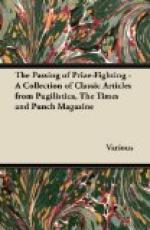In the ordinary way, short of desperate impulse and decision—unless by some happy chance I had relinquished the burden of this pen and taken happy service with one of the wine merchants who store their treasure there—I should never have entered Lower Robert Street at all, for it goes nowhere and runs under the earth, and it is damp and mouldy, and the only doors, leading to this vault and that, are locked. But for all these disabilities Lower Robert Street is, in Gotha and Zeppelin times, a very present help and refuge. There assemble, with more or less fortitude and philosophy, the denizens of the Adelphi, thankful indeed that the brothers Adam established their streets and terrace on so useful a foundation; and there twice recently have I joined them. And an odd assembly we have made, ranging as we do from successful dramatists to needy journalists, with an actress or so to keep us manly.
There for long hours have we waited until the “All clear” has sounded—or, at any rate, some have done so. As for myself, on the last occasion, taking advantage of a lull in the uproar, I crept away to bed, and, after falling into the sleep of exhaustion, had the ironical experience of being rudely awakened by the reassuring bugles and my night again ruined.
Having taken cover only in Lower Robert Street, which is open to all, I cannot with any personal knowledge speak of the camaraderie of private basements; but I suppose that that exists and is another of the War’s byproducts. I take it that, in the event of a sudden alarm, no householder with a cellar would be so inhuman as to refuse admittance to a stranger, and already probably a myriad new friendships and not a few engagements have resulted. Our own camaraderie is admirable. The federation of the barrage breaks down every obstacle; while a piece of shrapnel that one can display is more valuable than any letter of introduction, no matter who wrote it. Hence we all talk; and sometimes we sing too—choruses of the moment, for the most part, in one of which the depth of our affection for our maternal relative is measured and regulated by the floridity of the roses growing on her porch.
And yet, when at last friendliness is upon the town, there are people—and not only alien Hebrews either—who have been hurrying away from London! When London has become more interesting than ever before in its history there are people who leave it!
Personally I mean to cling to the old city as long as it will cling to me; but even now across one’s aching sight comes a “dream of pastime premature” which shakes such resolves a little. Peter, for example, has been having a disturbing effect on me. Only now and then, of course—when I am not quite myself; when the two and thirty (what remains of them) are not so firmly gritted as they should be; when even London seems unworthy of devotion.




